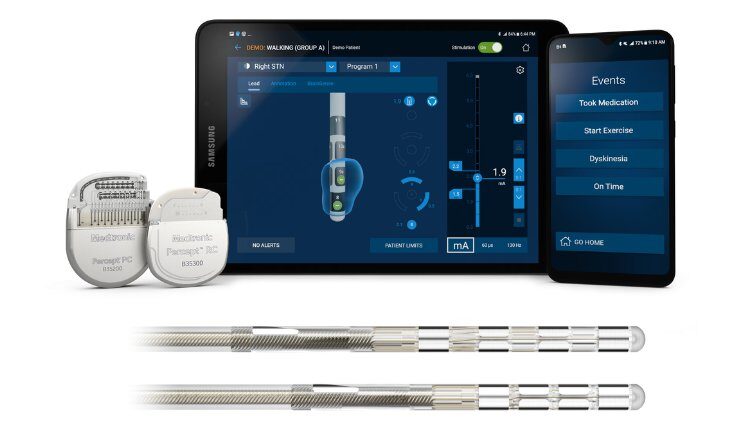The ground-breaking treatment uses ‘adaptive’ technology to improve electrical signals in the brain and reduce symptoms.
Over the last few years, a number of Newcastle patients have already had their condition improved through deep brain stimulation, which involves an implant to the brain controlled by a tiny computer in the chest that sends electrical messages to manage symptoms and restore quality of life.
This currently involves multiple trips to hospital so implant settings can be adjusted in response to a patient’s ongoing needs. At these appointments, the settings for the implant are programmed at levels deemed best to help the patient overall and, once optimised, there is little or no adjustment unless the patient reports a problem.
The current technology, known as Brainsense™, has allowed Newcastle surgeons to learn that individual patients’ needs for stimulation can vary throughout the day, sometimes by the minute. Until now, there was no way to change the settings frequently enough to adapt to this need.
However, ground-breaking technology launched this month, known as ‘adaptive deep brain stimulation’, does provide this level of responsiveness – taking the treatment to the next level.
Now, the individual patient’s implant and computer can provide a much more tailored and personalised treatment, using the body’s own signals to adapt and adjust to meet the patient’s needs, potentially on a minute-by-minute basis.
Following individual assessment for suitability, it’s anticipated all appropriate Newcastle patients with Parkinson’s will be able to benefit from the latest implant technology.
Mr Akbar Hussain, a functional neurosurgeon at Newcastle Hospitals who will be one of the first doctors in the world to offer the treatment, says:
“Each individual’s experience of Parkinson’s disease is different and unique to them. Symptoms and needs change over time, as the disease progresses, but they can also change within the course of a day.
“Newcastle was one of the first hospitals in the UK to use the current Brainsense™ technology – which senses a person’s response to brain stimulation and therapy. Our expertise and experience using this system means we’re now one of the first places in the world to be able to move to the next level and offer the latest adaptive technology to patients.
“The amazing thing about the adaptive version is that the electrical impulses provided to the brain by the device are controlled and adjusted automatically, according to individual patient’s recordings from the device in their chest.
“The biological signals generated within the person themselves are enough to alter the treatment given by the implant. These changes could be taking place by the minute or hour, meaning the treatment is truly responsive to the exact needs of each individual.
“I’m really excited and proud that we’re able to offer this to our patients.”
Patient, Kevin Hill, 65, will become one of the first people in the world to be treated using the new technology under the care of Mr Hussain. He said:
“Before the implant I suffered badly with tremors which affected my sleep and gave me terrible pains in my shoulders, arms and legs. It also affected me mentally – I became really self-conscious and withdrew from socialising or seeing other people.
“The medication I was on wasn’t really working and I also had to give up my job.
“When I was referred for deep brain stimulation, I was told it could take a while to have an impact but I had a great response and the improvement was instant.
“It has changed my life and completely removed my tremors, aches and pains. I’ve got more flexibility in my joints and my sleep is much less disturbed.
”I’m enjoying life again, seeing people, playing snooker and getting out on my bike.
“To know that I’m going to benefit even more from having the latest version of the technology is just fantastic.”
The adaptive deep brain stimulation technology was developed by Medtronic, a company which specialises in developing technology solutions for complex health conditions.
“Medtronic remains the only company in the world to offer a complete sensing-enabled deep brain stimulation system, and now we have enhanced this innovation to allow patients with Parkinson’s to spend less time thinking about their disease,” said Amaza Reitmeier, vice president, Neuromodulation marketing and strategy at Medtronic.
“Patients and clinicians have been eagerly awaiting these technology enhancements, which represent another transformative step forward in our ability to personalise therapy for people living with Parkinson’s.”
Around 153,000 people in the UK are living with Parkinson’s disease, a progressive neurological disorder affecting the brain and nervous system, in particular movement and balance. This number is expected to increase due to population growth and ageing.
Symptoms can be life-changing or life-limiting and include:
- Tremors or involuntary shaking in the hands, arms, legs or head.
- Muscle and joint stiffness and tension, making it hard to move around and which can cause pain.
- Impaired balance and coordination, slowness of movement.
- Loss of smell and digestive problems.
- Sleep disturbance and issues.
- Mental health problems.
